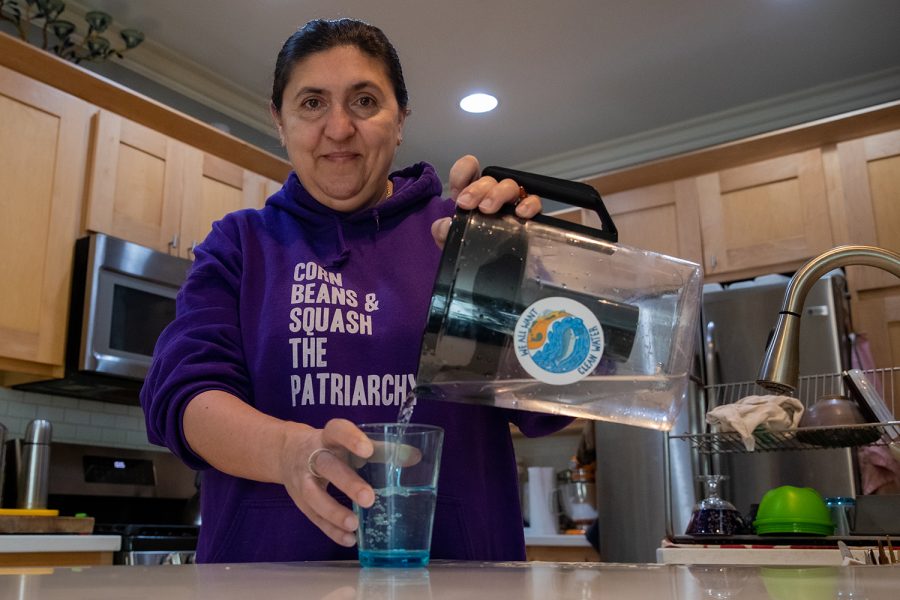University of Iowa professors, researcher launch podcast for water quality education
Two University of Iowa professors and a research engineer teamed up to create the We All Want Clean Water podcast to provide education about water quality issues in Iowa and what can be done to solve them.
University of Iowa professor Silvia Secchi is shown using a Britta filter in her home in Iowa City on Monday, Nov. 22nd, 2021.
November 28, 2021
Two University of Iowa professors and one engineering researcher have teamed up to create a podcast that dissects Iowa’s water quality problems.
The podcast, titled “We All Want Clean Water,” is hosted by Silvia Secchi, geographical and sustainability sciences associate professor; David Cwiertny, civil and environmental engineering professor; and Chris Jones, research engineer with IIHR-Hydroscience and Engineering.
Secchi said the team started the podcast because of the amount of people online, specifically on Twitter, who encouraged her and Jones to create one to discuss in depth the environmental issues they talked about on their social media accounts.
Jones uses his Twitter account, which has over 2,500 followers, to tweet links to research articles, water quality reports, news stories and more surrounding water quality in Iowa.
“We just felt that it would be important to bring a science based, interdisciplinary perspective to our conversations regarding water and environmental issues in Iowa,” Secchi said.
The podcast, co-hosted by Secchi, Jones, and Cwiertny, focuses on water quality in Iowa — a large portion of their expertise. The show published its first episode in October. Now, there are four episodes on Spotify and Buzzsprout ranging in topics from emerging contaminants to manure management plans.
Secchi said that, so far, the podcast has received a lot of positive feedback from listeners and the show’s popularity has grown. The podcast’s Twitter account, which is the main source of communication with its audience, was created in February and has since gained nearly 550 followers.
RELATED: Iowa City resolves high levels of zinc after EPA violation
Jones said that while the focus of the podcast is about opening discussion on the issues surrounding clean water, it is also an effort to educate the public on what is occurring in Iowa.
“It’s a lot for the average person to get their head around, and so the podcast is an effort to inform the public on what’s going on,” Jones said.
According to an Iowa Department of Natural Resources water quality assessment, a total of 585 waterbody segments were impaired in Iowa in 2020. An impairment is when a body of water doesn’t meet water quality standards or designated uses due to pollutants.
Cwiertny said most of the water quality issues in Iowa stem from a lack of regulations in the agricultural industry. The main issues are overusing pesticides and nutrients, such as nitrates, and ineffective manure management.
“We have to change our approach to how we think about water quality and agriculture in the state,” he said. “And we should expect that regulation is going to be necessary to make meaningful progress.”
Nutrient pollution in Iowa’s rivers is largely due to the agricultural industry. When nitrogen and phosphorus are used to fertilize a crop, the excess chemical that is not absorbed by the plant gets washed into water bodies when it rains, according to the Iowa Environmental Council.
Jones said the podcast aims to create a space where factual discussion of water quality issues and solutions can be discussed without politics playing a factor. One of the most important things was providing listeners with solutions, he said.
Cwiertny said one of the issues that occurs when water quality problems are discussed is urging people who believe there are no solutions to water problems to open their minds.
A lot of the solutions that are proposed take voluntary practices in the agricultural industry and make them regulated practices.
“That’s not popular, but that doesn’t mean that that’s not a solution and that doesn’t mean the solution should be ignored,” Cwiertny said.
Secchi said the political discourse surrounding water problems in the country is what inspired the name of the podcast.
“It’s meant ironically, because we all say we want clean water, but we don’t actually act as if we wanted clean water,” Secchi said. “If we all did want clean water in Iowa, it would look a lot cleaner than it does.”
Cwiertny said he hopes the podcast inspires listeners to learn more about their water and want to help make it better.
“What we want to do is keep being a trusted source so people can come and learn about the issues, the science behind them, and keep getting more people to care about water quality,” he said.














